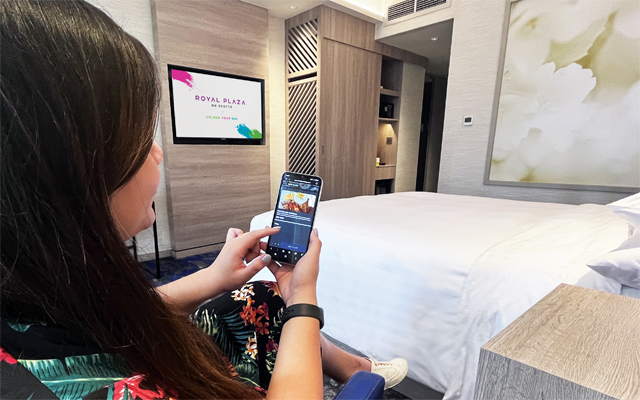When the innovation journey gets tough for Singapore’s hoteliers, the national digital champion, Infocomm Media Development Authority, steps in to show them the way
Digital transformation within Singapore’s hotel sector has picked up pace over the course of the pandemic disruption, as managers and operators realise a need to raise their efficiencies and service quality amid growing resource strains and changing consumer expectations.
As the national agency driving Singapore’s digital transformation and often the go-to for organisations seeking innovation clarity, the Infocomm Media Development Authority (IMDA) knows this best. It has seen a spike in assistance requests from hospitality organisations in recent years.

Ng Kaijie, director for innovation at IMDA, told TTG Asia that the Covid-19 pandemic was a “catalyst” for innovation.
“During the downtime, many hospitality managers were able to rethink their strategies and operations. Organisations with a bit more cash in hand were able to ponder about innovation so as to emerge better post-lockdown. The practice of social distancing then also forced hospitality managers to consider the possibility of an evolved face-to-face service expectation,” Ng elaborated.
However, the path from transformation realisation to innovation execution is not always well-lit.
“We had companies coming to IMDA saying that Generative AI is so hot now, how could it be applied to their business,” recalled Ng.
To move the cart behind the horse, IMDA leads companies into a conversation – a process the agency calls design thinking – to first identify their problem statement and desired outcome.
Ng said: “The technology to be applied is more of an afterthought; it may not be Generative AI at all.”
IMDA also helps companies to identify the right solution provider in a sea of options and stays on to provide advice throughout the innovation journey.
Ng said companies might not realise “things they need to consider in their innovation journey”, such as required equipment, customer data protection requirements, and cybersecurity strategy.

Essential help
IMDA’s Open Innovation Platform – which is free to use – supports and empowers companies to drive success through the innovation process. Companies seeking digital solutions start off by working with IMDA consultants to diagnose and refine their challenge statements, which are put up for quarterly Innovation Calls. During these calls, IMDA will scout for solvers from its pool of over 13,000 solution providers worldwide. Companies can then review proposals, select finalists, and fund their preferred solution provider to begin prototype.
For hoteliers that want an immediate solution to their problem, IMDA’s Discovery engine comes in handy. It functions like Google search, allowing users to type in what they are looking for and get some possibilities based on past winning solutions offered by listed solution providers. Hoteliers can then enquire with suggested solution providers.
IMDA only lists solution providers that were active in earlier Innovation Calls.
It also works with other agencies, like the Singapore Tourism Board (STB), to bring credible solution providers on board. STB has its own rigorous selection process for its Singapore Tourism Accelerator, a programme that gathers the world’s most promising technology startups or scale-ups that can power the travel and tourism industry.
Spotlight: Vouch
Established in 2016, Vouch has been catalysing digital transformation in the hospitality industry through a whole technology stack that supports rooms & housekeeping, F&B, and revenue departments. It won the Singapore Tourism Awards’ Best Business Innovation award in 2019 and was named one of PhocusWire’s Hot 25 start-ups for 2021.
Joseph Ling, CEO and founder of Vouch, recalled that Vouch started off wanting to solve hotels’ labour problem.
“It still is the main problem we are trying to solve,” he said. “Hotels in Singapore have a major labour issue, which existed even before the pandemic; Covid-19 exacerbated it.”
Ling sees the potential for technology to improve several processes in a hotel.
He said: “In some countries, language is a problem because English literacy is not very high. Communicating with foreign tourists is a challenge. Technology can help. In some countries, hotels are under pressure to drive up ancillary revenue. Technology can help.”
He added that understanding data could take innovation for efficiencies even farther. However, this requires data analysts who are also familiar with hotel operations.
“Not all hotels can afford such a resource,” reflected Ling, who is now looking at ways to use AI to process data and produce insights that enable process tweaks.
Labour pains
While acknowledging that hotels are a high-touch business, Neeta Dave, director of operations at Royal Plaza on Scotts, a hotel located in a prime section of Singapore’s Orchard Road shopping belt, has had to rely on technology to ease manpower strains.
The hotel uses a Vouch system that allows guests to convey common requests – like extra water, fresh towels, and dinner reservations at the hotel – via a QR code. Guests can also indicate in the system their desire for the concierge or housekeeping attendant to call them back for more complex requirements. With this system, the hotel no longer need to dedicate staff to answering calls.
“Our staff can be directed to other important tasks that would build their job expertise or give them a more rewarding job experience,” said Neeta.
Obstacles to change
As people are by nature resistant to change, both Ling and Neeta said patience is needed for successful transformation.
Ling said: “I’ve learnt that we cannot give a software to a customer and expect improvement to happen. Innovation adoption must be paired with change management. We have to advise them on how to improve their processes with the software, be patient, and make changes step by step for all users.”
Neeta advised communicating the need for innovation clearly to employees to eliminate suspicion that technology would replace them.
It was also important to have support from the general manager and the board for innovation to work, she added.
To further improve operational efficiencies, Royal Plaza on Scotts will by end-March install check-in kiosks in the hotel lobby. Neeta said: “Even with this facility, staff need not fear replacement because they will be stationed at the kiosks to assist guests who need help.”




















